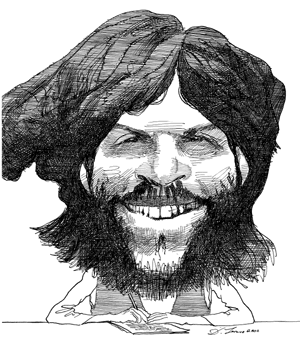
introducing readers to writers since 1995
January 13, 2005
"Meditation Didn't Help," He Joked
by Ron Hogan It's been far too long since I've been to the New York Public Library, but I'd seen a William Grimes review of An End to Suffering a few weeks ago, so when I found out earlier this week that the author, Pankaj Mishra, would be answering Jonathan Schell's questions about Buddhism, I immediately made plans to see him.
It's been far too long since I've been to the New York Public Library, but I'd seen a William Grimes review of An End to Suffering a few weeks ago, so when I found out earlier this week that the author, Pankaj Mishra, would be answering Jonathan Schell's questions about Buddhism, I immediately made plans to see him.
Apparently I had a much easier time getting to the NYPL than Mishra did; we learned that just last week, Mishra had been coming back from a journalistic trip through Pakistan and Afghanistan when he was stopped at customs in JFK and, as he described it, "taken to a little cell where people who looked like me were sitting," where he was detained for several hours and threatened with deportation because an immigration official spotted "something on his computer" that made Mishra look suspect. Sounds like Ian McEwan got off easy compared to Mishra, who was clearly still rattled by the experience--and the blue-city New York audience was sympathetically anxious for him as well.
At any rate, Schell began the main thread of discussion by musing aloud about the idea of meditation as a "technology of the self" deployed for the purpose of self-examination, and Mishra eagerly dove into an explanation of the principles of detachment and observation, noting the Buddha's goal to "undermine the pretensions of the self," that sense of an important identity constructed out of past experiences. Later, the conversation worked its way round to Nietzsche and how he compared himself to the Buddha ("one of the few people he actually admired," Mishra quipped), which struck Schell as a little odd: how do you reconcile the will to power with the obliteration of the self, after all? Then they turned to Gandhi, and how withdrawal into the world could be transformed into "militant non-violence" with an expressly political goal. Finally, they addressed Buddhism's challenge to nationalist identity, because of its concern with the ethical life of the individual rather than identification with illusory abstractions. Ultimately, Mishra suggested Buddhism was "a different way of being modern," an alternative to the progress-driven Western interpretation of history...and after some discussion of the contemporary political scene, the evening was over, and I had a firm addition to my reading list.
David Levine caricature from NYRB
your PayPal donation
can contribute towards its ongoing publication.